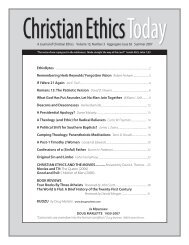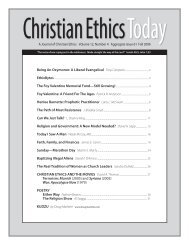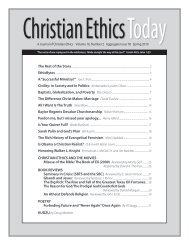Issue 032 PDF Version - Christian Ethics Today
Issue 032 PDF Version - Christian Ethics Today
Issue 032 PDF Version - Christian Ethics Today
You also want an ePaper? Increase the reach of your titles
YUMPU automatically turns print PDFs into web optimized ePapers that Google loves.
was intense during the discussion of such dogma, and especially<br />
when the final vote was announced. You recall that in the midst<br />
of all the tenseness and tumult of that excited assemblage,<br />
Cardinal Manning stood on an elevated platform, and in the<br />
midst of that assemblage and holding in his hand the paper just<br />
passed, declaring for the infallibility of the Pope, he said: “Let all<br />
the world go to bits and we will reconstruct it on this paper.” A<br />
Baptist smiles at such an announcement as that, but not in derision<br />
and scorn. Although the Baptist is the very antithesis of his<br />
Catholic neighbor in religious conceptions and contentions, yet<br />
the Baptist will whole-heartedly contend that his Catholic<br />
neighbor shall have his candles and incense and sanctus bell and<br />
rosary, and whatever else he wishes in the expression of this worship.<br />
A Baptist would rise at midnight to plead for absolute religious<br />
liberty for his Catholic neighbor, and for his Jewish<br />
neighbor, and for everybody else. But what is the answer of a<br />
Baptist to the contention made by the Catholic for papal infallibility?<br />
Holding aloft a little book, the name of which is the New<br />
Testament, and without any hesitation or doubt, the Baptist<br />
shouts his battle cry: “Let all the world go to bits and we will<br />
reconstruct it on the New Testament.”<br />
Direct Individual Approach to God<br />
When we turn to this New Testament, which is Christ’s<br />
guidebook and law for his people, we find that supreme<br />
emphasis is everywhere put upon the individual. The individual<br />
is segregated from family, from church, from state, and from<br />
society, from dearest earthly friends or institution, and brought<br />
into direct, personal dealings with God. Every one must give<br />
account of himself to God. There can be no sponsors or<br />
deputies or proxies in such vital matter. Each one must repent<br />
for himself, and believe for himself, and be baptized for himself,<br />
and answer to God for himself, both in time and in eternity. The<br />
clarion cry of John the Baptist is to the individual, “Think not<br />
to say within yourselves, We have Abraham to our father: for I<br />
say unto you, that God is able of these stones to raise up children<br />
unto Abraham. And now also the ax is laid unto the root of<br />
the trees: therefore every tree which bringeth not forth good<br />
fruit is hewn down, and cast into the fire.” One man can no<br />
more repent and believe and obey Christ for another than he<br />
can take the other’s place at God’s judgment bar. Neither persons<br />
nor institutions, however dear and powerful, may dare to<br />
come between the individual soul and God. “There is . . . one<br />
mediator between God and men, the man Christ Jesus.” Let the<br />
state and the church, let the institution, however dear, and the<br />
person, however near, stand aside, and let the individual soul<br />
make its own direct and immediate response to God. One is our<br />
pontiff, and his name is Jesus. The undelegated sovereignty of<br />
Christ makes it forever impossible for his saving grace to be<br />
manipulated by any system of human mediation whatsoever.<br />
The right to private judgment is the crown jewel of humanity,<br />
and for any person or institution to dare to come between<br />
the soul and God is a blasphemous impertinence and a defamation<br />
of the crown rights of the Son of God.<br />
Out of these two fundamental principles, the supreme<br />
authority of the Scriptures and the right of private judgment,<br />
24 • FEBRUARY 2001 • CHRISTIAN ETHICS TODAY<br />
have come all the historic protests in Europe and England and<br />
America against unscriptural creeds, polity and rites, and<br />
against the unwarranted and impertinent assumption of religious<br />
authority over men’s consciences, whether by church or by<br />
state. Baptists regard as an enormity any attempt to force the<br />
conscience, or to constrain men, by outward penalties, to this or<br />
that form of religious belief. Persecution may make men hypocrites,<br />
but it will not make them <strong>Christian</strong>s.<br />
Infant Baptism Unthinkable<br />
It follows, inevitably, that Baptists are unalterably opposed to<br />
every form of sponsorial religion. If I have fellow <strong>Christian</strong>s<br />
in this presence today who are the protagonists of infant baptism,<br />
they will allow me to say frankly, and certainly I would say<br />
it in the most fraternal, <strong>Christian</strong> spirit, that to Baptists infant<br />
baptism is unthinkable from every viewpoint. First of all,<br />
Baptists do not find the slightest sanction for infant baptism in<br />
the Word of God. That fact, to Baptists, makes infant baptism a<br />
most serious question for the consideration of the whole<br />
<strong>Christian</strong> world. Nor is that all. As Baptists see it, infant baptism<br />
tends to ritualize <strong>Christian</strong>ity and reduce it to lifeless<br />
forms. It tends also and inevitably, as Baptists see it, to secularizing<br />
of the church and to the blurring and blotting out of the<br />
line of demarcation between the church and the unsaved world.<br />
And since I have thus spoken with unreserved frankness, my<br />
honored Pedobaptist friends in the audience will allow me to<br />
say that Baptists solemnly believe that infant baptism, with its<br />
implications, has flooded the world, and floods it now, with<br />
untold evils.<br />
They believe also that it perverts the scriptural symbolism of<br />
baptism; that it attempts the impossible tasks of performing an<br />
act of religious obedience by proxy, and that since it forestalls the<br />
individual initiative of the child, it carries within it the germ of<br />
persecution, and lays the predicate for the union of church and<br />
state, and that it is a Romish tradition and a corner-stone for the<br />
whole system of popery throughout the world.<br />
I will speak yet another frank word for my beloved Baptist<br />
people, to our cherished fellow <strong>Christian</strong>s who are not Baptists,<br />
and that word is that our Baptist people believe that if all the<br />
Protestant denominations would once for all put away infant<br />
baptism, and come to the full acceptance and faithful practice of<br />
New Testament baptism, that the unity of all the non-Catholic<br />
<strong>Christian</strong>s in the world would be consummated, and that there<br />
would not be left one Roman Catholic church on the face of the<br />
earth at the expiration of the comparatively short period of<br />
another century.<br />
Surely, in the face of these frank statements, our non-Baptist<br />
neighbors may apprehend something of the difficulties compelling<br />
Baptists when they are asked to enter into official alliances<br />
with those who hold such fundamentally different views from<br />
those just indicated. We call God to witness that our Baptist people<br />
have an unutterable longing for <strong>Christian</strong> union, and believe<br />
<strong>Christian</strong> union will come, but we are compelled to insist that if<br />
this union is to be real and effective, it must be based upon a better<br />
understanding of the Word of God and a more complete loyalty<br />
to the will of Christ as revealed in His Word.












